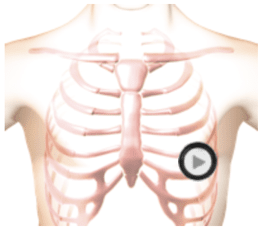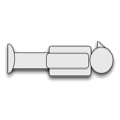An early peaking, harsh diamond-shaped systolic murmur starts at the beginning of systole and ends well before the second heart sound. A fourth heart sound gallop is also present in diastole as you can readily see on the wave form tab.
S1 is increased due to a hyperdynamic left ventricle. S2 is single.
On the anatomy video you can see that the contraction of the left ventricle is strong and occurs in a reduced amount of time. Anatomically, the septal wall is very much thicker than the rest of the ventricle, but this is not shown in the animation.
The strong contraction of the left ventricle causes the anterior leaflet to be sucked into the ventricle, blocking the flow into the aorta and causing an aortic murmur. At the same time turbulent flow from the left ventricle to the left atrium causes a second murmur. Since the two murmurs occur at the same time, you hear a single murmur.
You can hear the difference between the two murmurs by moving the stethoscope head the aortic to the mitral valve area. First, you will hear the diamond shaped aortic murmur and later the rectangular pansystolic murmur.
Hypertrophic Cardiomyopathy Audio


Technique

The patient's position should be supine.
Auscultation Tips for Hypertrophic Cardiomyopathy
S1:Increased intensity. Can be loudest at tricuspid area (4th ICS)Systole:Diamond-shaped, early peaking, harsh
Diastole:S4 gallop is present
Sound Wave
Hypertrophic Cardiomyopathy Video
Observing the animation, you can see that the contraction of the left ventricle is strong and occurs in a reduced amount of time. Anatomically, the septal wall is very much thicker than the rest of the ventricle, but this is not shown in the animation.
Authors and Sources
Authors and Reviewers
- ECG heart rhythm modules: Thomas O'Brien.
- ECG monitor simulation developer: Steve Collmann
-
12 Lead Course: Dr. Michael Mazzini, MD.
- Spanish language ECG: Breena R. Taira, MD, MPH
- Medical review: Dr. Jonathan Keroes, MD
- Medical review: Dr. Pedro Azevedo, MD, Cardiology
- Last Update: 11/8/2021
Sources
-
Electrocardiography for Healthcare Professionals, 6th Edition
Kathryn Booth and Thomas O'Brien
ISBN10: 1265013470, ISBN13: 9781265013479
McGraw Hill, 2023 -
Rapid Interpretation of EKG's, Sixth Edition
Dale Dublin
Cover Publishing Company -
EKG Reference Guide
EKG.Academy -
12 Lead EKG for Nurses: Simple Steps to Interpret Rhythms, Arrhythmias, Blocks, Hypertrophy, Infarcts, & Cardiac Drugs
Aaron Reed
Create Space Independent Publishing -
Heart Sounds and Murmurs: A Practical Guide with Audio CD-ROM 3rd Edition
Elsevier-Health Sciences Division
Barbara A. Erickson, PhD, RN, CCRN -
The Virtual Cardiac Patient: A Multimedia Guide to Heart Sounds, Murmurs, EKG
Jonathan Keroes, David Lieberman
Publisher: Lippincott Williams & Wilkin)
ISBN-10: 0781784425; ISBN-13: 978-0781784429 - Project Semilla, UCLA Emergency Medicine, EKG Training Breena R. Taira, MD, MPH
-
ECG Reference Guide
PracticalClinicalSkills.com
Hypertrophic Cardiomyopathy | Auscultation Cheat Sheet with Sounds & Video | #93